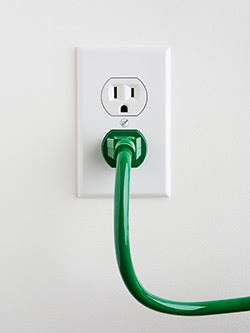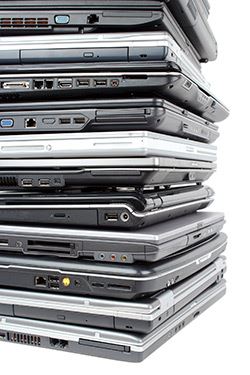Going green in business
Does your business leave an ecological footprint? Take a look at some of our tips for a greener business practice.
There's this theory that you have to pick one: economics or environmental performance. That's nonsense. Innovation is the way you can have both. Companies that don't get this, really risk becoming irrelevant to the marketplace." Mark Vachon, vice president of GE's ecomagination
Considering the current environmental situation a growing amount of businesses are looking at going green. This can come in the form of reducing energy usage, resource consumption and carbon emissions and recycling more among many others. This becomes even more important when we learn that it is something being considered more and more often by customers and partners when deciding on a service provider. The really interesting thing though is that operating with a green policy seems to be able to save a few pounds here and there too - in fact, with a little bit of effort (maybe a bit of investment), this saving can be stretched to quite a considerable amount. In this series of articles we will be looking at tips for going green in the workplace, how to save money and green business grants.
The key to successfully converting your business is in the small details. Don't get us wrong - we're all for installing wind farms and solar panels on the roof but before you do there are literally hundreds of small changes that will build your momentum and need very little effort or investment. When combined together you can radically improve your ecological footprint as well as your overheads.

Manage your energy usage
Take some time to think about how you can reduce your energy bills. Is there anyone in your office/workplace who takes responsibility for making sure all the lights, computers, printers, microwaves, TVs, phone chargers, heating, hand dryers and everything else are all switched off at the end of each day? Sure, you're paying someone for five minutes that they are not at their desk which, admittedly adds up over the year but you could make that back in the saving on your electricity bills alone.
And what about the efficiency of your machines? New computers are not only expensive, but they take a lot of resources to manufacture, package, and then ship. Is it possible that you can extend their life and enjoy continued efficiency? As always there is no magical answer but simply put, with proper care, maintenance and understanding the answer is yes!
A UK business used a £1,000 Energy Efficiency grant from Richmond Council to replace 62 tube lights to T5 energy efficient lighting throughout the shop. This change saved £2,282 on the annual energy bill and 8.52 tonnes of CO2 emissions.
A few things you can do right now
-
Use 'power management' on your computers. This is a timer that will put your computer in stand-by or to sleep while it's not being used. Although this is becoming general practice, a surprising amount of people still leave their computers on full power even when going to lunch!
-
Schedule regular system checks - Defragment, clean fans, check cables, run diagnostic software (There is a range of free software that can diagnose and fix slow or underperforming computers).
-
Upgrade hardware (processers, hard drives etc.) where possible rather replace entire systems.
-
Older versions of software will take less processing power on old machines - plus they can cost pennies on eBay.
-
So you're old machines just aren't powerful enough to cope with the necessary software upgrades being introduced. You can avoid the hassle and cost of disposal, generate good will and save the purchase of more new products from others by donating the equipment to schools, charities and friends.

You're computers are only the first step though. Below we have compiled a list of our top tips for generally reducing your consumption, cost and office pollution. This list is by no means exhaustive though. There are hundreds of resources on the net with the thousands of ideas. If you're serious about 'going green' be sure to take a look around and most importantly, share your ideas with the wider community.
-
Switch to energy efficient lighting
-
Turn the heating down - 2 or 3 degrees will probably go unnoticed but will quickly add up to a considerable reduction.
-
Source furniture and consumables accredited by the FSC (Forest Stewardship Council)
-
It's not only your business you have to be aware of but also the people you work with. Consider your partners based on their commitment to running a sustainable practice too - otherwise you will undo all your hard work by contracting someone who may waste energy on your behalf.
-
Use fewer chemicals - Some of the strongest pollutants are mostly likely in your cleaners cupboard so look to use less and safer supplies.
-
Field studies have shown that potted-plants can reliably reduce total volatile organic compound (TVOC) loads, a major class of indoor pollutants, by 75%
Your building accounts for 70% of your businesses energy usage. The average business can save around £7000 by improving their energy efficiency.
Be sure to check back soon or follow us on Facebook or Twitter for news and advice on other business topics.
Date: June 03, 2024
Category: Other




